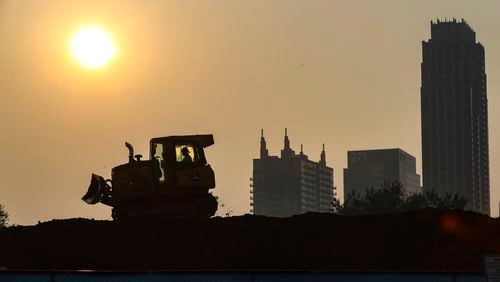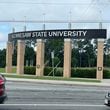As Atlanta’s climate becomes more harsh in the coming years, low-income residents will be able to access city funds to help transition their homes to more sustainable energy systems.
Atlanta City Council passed legislation Monday that creates a new pool of money to help reduce energy bills for households in areas of the city plagued by high temperatures, limited tree cover and outdated cooling systems.
Council members approved the transfer of $500,000 from the Affordable Housing Trust Fund to the new Atlanta Community Energy Fund to both help residents through energy programs and support the city’s lofty goal of reaching 100% clean energy by 2035.
A citywide study last year found that residents in neighborhoods to the west and south of downtown are most vulnerable to climate change-fueled weather events like flash floods and extreme temperatures.
Residents in those areas face disproportionate financial impact from weather disasters, and the everyday struggle to stay cool, according to the study.
Atlanta was the first city in the country to conduct a block-by-block heat vulnerability study, said Council member Liliana Bakhtiari, who championed the climate fund bill.
“One of those things that was quickly identified in the process was energy burden,” she said. “There are people — low-income households and especially low-income renters — who are having to choose between paying their utilities and essentially feeding themselves or treating illnesses by going to the doctor.”
With the start-up money, the mayor’s Office of Sustainability and Resilience will begin building out various programs over the next year like a process to help residents pay for utilities.
Based on data from Georgia Power — including a new rate increase set to hit bills starting this month — the average Atlanta customer pays $165.39 a month for utilities.
“This is about not just offering BandAids to long term problems,” Bakhtiari said. “This is also about creating opportunities for affordable weatherization to keep the cost of housing low.”
Future funding for the trust will come from various streams like revenue from sustainable energy tax credit programs, federal grants and the city’s general fund, she said.
During the committee review of the legislation, council members went back and forth over how much money to initially dedicate to the fund — at one point the amount dipped to $300,000.
Council member Alex Wan, who sponsored the bill alongside Bakhtiari, pushed to increase the funding up to $500,000.
“I know that the intent was to put some seed money in there,” he said. “And this is definitely a far cry from the amounts that we were originally contemplating when these discussions began.”
“If we’re going to do this, I think we need to do it meaningfully,” Wan said. “And I just don’t think ($300,000) is signaling what I think the city should be signaling.
Atlanta Mayor Andre Dickens also has an ambitious goal of the city reaching 100% clean energy by 2035.
“Close to 50,000 households are energy burdened within our city, and we are constantly searching for ways to help,” he said in a statement. “We are following a strategic roadmap to reduce overall energy consumption and emissions within the City’s buildings and the Atlanta Community Energy Trust Fund will allow for innovative solutions and swifter action as we focus on energy efficiency solutions.”







